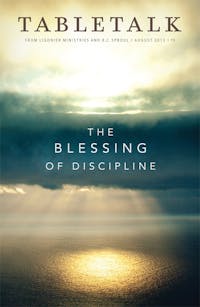
Request your free, three-month trial to Tabletalk magazine. You’ll receive the print issue monthly and gain immediate digital access to decades of archives. This trial is risk-free. No credit card required.
Try Tabletalk NowAlready receive Tabletalk magazine every month?
Verify your email address to gain unlimited access.
The KISS principle—Keep It Simple, Stupid—is itself a rather simple principle. It argues that when we find ourselves entangled in complex and complicated arguments, chances are we have already left the proper playing field. While, for instance, the gospel is a glory that can be studied and expounded upon for a lifetime of lifetimes, we nevertheless confess that something has gone wrong if we cannot rejoice in our salvation simply by confessing, “Lord be merciful to me, a sinner.” Jesus said that the man who prayed that way went home justified (Luke 18:14).
The same is true after our souls are saved. Our forgiveness, our justification, our adoption all flow out of a glorious but simple truth that while we were yet sinners Christ died for us (Rom. 5:8). Our sanctification, however, our calling to grow in grace and wisdom, to put to death the old man, to become more like Jesus—this is simple too. There is no great and deep secret—we are called to trust and obey.
This not only describes our sanctification, but as the old hymn points out, this describes the only way to be happy in Jesus. That is, the key to having a good life is profoundly simple. Now there have been many who complained about the bestselling book Your Best Life Now by Joel Osteen that it was way too simple, that it lacked substance or heft, that it was the spiritual equivalent of a spool of cotton candy. I haven’t read the book, but I suspect my concern would be just the opposite. I’m not opposed to having a good life. I wish it for my children, for my friends, even for everyone who reads this article. So I am not opposed to advice on how to have a good life. I am opposed to bad advice.
The key to living a good life is abundantly simple. According to our Maker, what we must do if we want things to go well for us in the land He has given us, is to honor our fathers and mothers. This is the first command with a promise (Eph. 6:2–3). The promise is that it will go well for us in the land.
The world tells us that the key to a good life is a good education. Do well in school and you will get into a competitive college. Do well there and you will get into a competitive graduate school. Do well there and you will get a good, high-paying job. Then you will be able to afford a house in a neighborhood with good schools so that your children can do just what you did, and your grandchildren after them. I call this hell’s hamster wheel.
God’s plan is so much more plain, so much more simple. Which is likely why we don’t believe it. We are offended by simplicity. In our pride, we like to believe that anything worth having must be terribly difficult to get, and terribly difficult to figure out how to get. We would rather go it alone and have it go poorly for us in the land than embrace the simple truth that we just need to honor those God has placed in authority over us.
Or is that the real rub? Is our objection not the simplicity of the rule, but the rule itself? That is, do we object to God’s promise that it will go well for us in the land if we submit to those in authority over us because we don’t want to submit to those in authority over us?
The devil, before his fall, lived a rather spectacular life. He threw it all away because he didn’t want to be ruled. Adam and Eve lived in a literal paradise, the land God had given them. All they had to do to stay there forever was submit to their Father. They threw it all away. And we are their children. Is this not the very essence of what Jesus taught in the Sermon on the Mount? What does it mean to seek first the kingdom of God and His righteousness but to pursue obedience to our heavenly Father with a single minded passion? Does He not tell us to set aside our worries about all those things we think will give us a good life and to give ourselves to seeking His righteousness? The simple question is, do we trust our Father? Do we believe that His law is a burden to submit to, or a map to joy?
Of course there are selfish husbands. There are sinful parents. There are faithless elders. There are corrupt civil leaders. All of these, however, existed when our giving, sinless, faithful, pure Father promised us it would go well for us if we would submit to those in authority over us. He not only knows best, but He controls all things. He, after all, has the whole world in His hands.
There is no need to toss and turn all night wondering what you should do differently to make a better life. Seek first the kingdom of God, and His righteousness. Submit to those in authority over you: “Obey your parents in the Lord, for this is right. ‘Honor your father and mother’ (this is the first commandment with a promise), ‘that it may go well with you and you may live long in the land'” (Eph. 6:1–3). Keep it simple, and be wise. It will go well for you.
